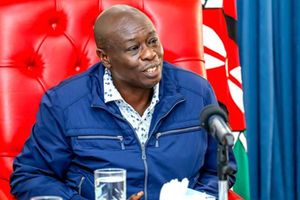Governors urge release of Sh3 billion county HQs cash

Lamu Governor Issa Timamy before a parliamentary committee on June 22. His county is among those that are yet to complete their headquarters projects.
Governors of five counties that do not have new headquarters are demanding at least Sh3 billion from the national government to complete the buildings.
The county chiefs also want the transfer of the funds from the Public Works department to the devolved units expedited. The governors include Tharaka Nithi’s Muthomi Njuki, Kiarie Badilisha of Nyandarua, Isiolo’s Abdi Guyo, Issa Timamy (Lamu) and Dhadho Godana (Tana River).
Appearing before the Senate Finance Committee yesterday, the governors asked the senators to request the national government to release the funds as conditional grants. They told the committee led by Mandera Senator Ali Roba that most counties had already provided their 30 per cent contribution, but nine years later, there is nothing to show since the two levels of government signed agreements in 2015.
Mr Njuki said that most buildings are 60 per cent done though money appropriated every year towards the project is little.
In the financial year ending June 2024, only Sh454 million has been allocated for the five counties in question.
“This amount falls significantly short of the required funding for each county, which amounts to approximately Sh600 million. This stark disparity highlights the funding gap and the challenges faced in adequately financing the building projects,” said Mr Njuki.
The governor questioned the rationale behind channeling a specific grant through Public Works when many other such grants are successfully implemented by the counties themselves.
“We have many conditional grants that are being implemented successfully by the counties, why does this specific one have to be channelled through Public Works? What is the logic behind it?” asked Mr Njuki.
“The cost of project when we signed the projects for Tharaka Nithi was Sh366 million, today, evaluation tells us we need around Sh600million if we have to complete the same project, which would not have been the case if it was done within the time frame,” Mr Njuki said.
Mr Timamy said his county signed a contract worth Sh126 million and also dutifully paid the 30 per cent of the agreed amount. At that time, he said, the building was approximately 65 per cent complete, and the government urged the county to expedite the remaining payments. However, despite numerous promises, very little has been accomplished.
“It is frustrating to have an unfinished building standing for nearly nine years, especially considering that our counties have successfully undertaken similar construction projects,” he said.
He urged the national government to release the remaining 70 per cent of the funds to the counties. “Due to logistical issues, the national government has not yet provided any funds. Our plea to the Senate, as advocates for devolution, is to intervene and unlock funds that have been allocated in the budget, yet they remain inaccessible,” said the governor.
The senators agreed with the governors, saying they will ask the National Treasury to write to Public Works to do a status report on the projects as well as do a completion bill of quantities based on the current rates.
Kakamega Senator Boni Khalwale said an assessment report of what is required for the projects to be finished should be handed over to the county governments for them to take over. “There is no other way other than to allow counties to take charge of their own headquarters,” he said.
“We will invite the CS Treasury because as it is, the money that is allocated, the Sh450 million, is in the county additional allocation ... We will prevail upon them to release the funds to the recipient counties to take over the construction of the county headquarters, said Mr Roba.
Mombasa Senator Mohamed Faki said: “We need to request the National Treasury that whatever they have promised ... we fix it within the supplementary budget and give that money to the recipient counties as conditional grants.”





